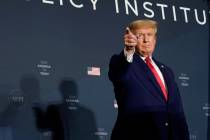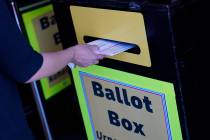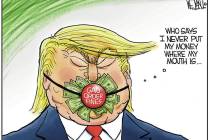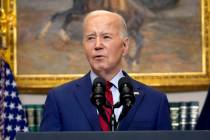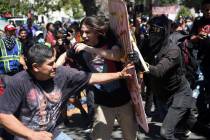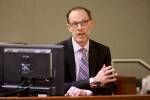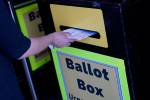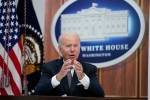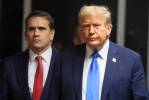Ungag judicial candidates
The truth, the whole truth and nothing but the truth?
Our lords and judicial masters seem to be confusing the witness stand and the campaign trail.
Judges hold themselves up to be better than mere mortals who must abide by the Constitution. They are so special they even have an initiative on Tuesday's ballot that calls for "merit selection" of judges, basically implying we voters are too stupid to decide who has the august sagacity needed to sit in black robes on the elevated throne I mean bench.
This past week, the state Standing Committee on Judicial Ethics and Election Practices officially slapped the wrist of a candidate for District Court judge for a statement she made on television. Not because she told a falsehood. No, because she told the truth -- but not the whole truth, in their judicious opinion.
Joanna Kishner, candidate for Clark County's Department 31, was publicly censured for saying during a joint televised interview with opponent Phil Dabney that he had improperly obtained $250,000 from an elderly client's estate.
The ruling of the ethics panel conceded Kishner's statement was not false, saying "there is ample proof that carefully parsed and skillfully delivered the individual statements were either factual or Kishner's opinions or a combination of both facts and opinion."
So, what's the problem?
The committee found her statement was "not 'scrupulously' -- meaning conscientious and exact; painstaking -- fair and accurate and she omitted facts necessary to avoid creating a false implication about Dabney that could mislead voters."
Never mind that Dabney was sitting right there and conceivably could have offered those facts himself. No, the committee said she should have noted that the rules of conduct were violated by Dabney's law partner, though a violation extends to every member of the same law firm. They said she should "err to accuracy and not the political sound-bite."
Kishner objected that she was "cut off" by the moderator, but the omniscient panel members said she should have known she might not have time to explain the nuances.
They actually wrote in their decision, "Kishner selected this forum to make her charge of unfitness against Dabney with actual knowledge or reckless disregard that once the charge was made she might not be given the opportunity to fully explain."
The candidate was censured for violating Nevada Judicial Canon 4, which "obligates candidates and their committees to refrain from making statements that are false or misleading, or that omit facts necessary to make the communication considered as a whole not materially misleading."
The whole truth?
Abridging of free speech is not just limiting or stopping speech, but compelling speech.
Though many states have such canons telling judicial candidates what they can and cannot say, U.S. Supreme Court Justice Antonin Scalia ruled in 2002 in the case of the Republican Party of Minnesota v. White that judicial candidates may not be denied First Amendment rights.
"Moreover, the notion that the special context of electioneering justifies an abridgment of the right to speak out on disputed issues sets our First Amendment jurisprudence on its head," Scalia wrote. " '[D]ebate on the qualifications of candidates' is 'at the core of our electoral process and of the First Amendment freedoms,' not at the edges. We have never allowed the government to prohibit candidates from communicating relevant information to voters during an election."
Scalia also made specific reference to the American Bar Association's long and frequent endorsement of so-called merit selection of judges rather than election. He quoted from Justice Thurgood Marshall's dissent in a prior case, "[T]he greater power to dispense with elections altogether does not include the lesser power to conduct elections under conditions of state-imposed voter ignorance. If the State chooses to tap the energy and the legitimizing power of the democratic process, it must accord the participants in that process the First Amendment rights that attach to their roles."
The Constitution denies judges, legislators and executives the power to decide what people may or may not hear from their candidates. It is the purview of the voters to determine whether the candidate is speaking enough truth and whether the candidate displays the character and veracity to be a judge. Candidates must be given free rein to show just who they are, especially if they have a tendency to hedge the truth.
Late Thursday, federal Judge Roger Hunt issued a temporary restraining order blocking the Kishner censure, saying the canon was unconstitutionally vague. He wrote that a "judicial candidate cannot objectively ascertain what additional facts must be included to avoid a 'materially misleading statement.' "
Hopefully, some court will resolve this soon.
By the way, the Review-Journal endorsed Dabney, saying of Kishner, "her legalistic approach fails to exhibit much in the way of real-world experience or common sense."
We didn't need an official judicial panel of experts to hold our hands and explain the nuances.
Thomas Mitchell is editor of the Review-Journal and writes about the role of the press, free speech and access to public information. He may be contacted at 383-0261 or via e-mail at tmitchell@ reviewjournal.com. Read his blog at lvrj.com/blogs/mitchell.








